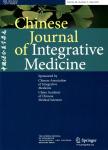Asymmetric Dimethylarginine Predicts One-year Recurrent Cardiovascular Events: Potential Biomarker of "Toxin Syndrome" in Coronary Heart Disease
Asymmetric Dimethylarginine Predicts One-year Recurrent Cardiovascular Events: Potential Biomarker of "Toxin Syndrome" in Coronary Heart Disease作者机构:Cardiovascular Diseases CenterXiyuan HospitalChina Academy of Chinese Medical SciencesBeijing(100091)China Department of CardiologyChina-Japan Friendship HospitalBeijing(100029)China
出 版 物:《Chinese Journal of Integrative Medicine》 (中国结合医学杂志(英文版))
年 卷 期:2019年第25卷第5期
页 面:327-333页
核心收录:
学科分类:1002[医学-临床医学] 100201[医学-内科学(含:心血管病、血液病、呼吸系病、消化系病、内分泌与代谢病、肾病、风湿病、传染病)] 10[医学]
基 金:Supported by Chinese National Program of Key Basic Research(No.2006CB504803) Beijing Committee of Science and Technology(No.D08050703020801) the 12th Five-Year Plan of China(No.2013BAI02B01)
主 题:asymmetric dimethylarginine recurrent cardiovascular event nested case-control study coronary heart disease toxin syndrome
摘 要:Objective: To examine the prognostic value of serum levels of asymmetric dimethylarginine(ADMA)in patients with stable coronary heart disease(CHD) thus explore a potential biomarker of toxin syndrome in ***: In this prospective nested case-control study, 36 of 1,503 Chinese patients with stable CHD experienced at least 1 recurrent cardiovascular event(RCE) during 1-year fol ow-up. Serum levels of ADMA at the start of fol ow-up were compared between these 36 cases and 36 controls which matched to cases in terms of gender, age, history of hypertension, and myocardial infarction. Results: Based on the crude model, subjects in the 2 highest ADMA quartiles showed signi?cantly higher risk of developing RCE than those in the lowest ADMA quartile [odds ratio(OR) 4.09, 95%confidence interval(CI) 1.01 to 16.58; OR 6.76, 95% CI 1.57 to 29.07]. This association was also observed in the case-mix model(OR 5.51, 95% CI 1.23 to 24.61; OR 7.83, 95% CI 1.68 to 36.41) and multivariable model(OR 6.64,95% CI 1.40 to 31.49; OR 13.14, 95% CI 2.28 to 75.71) after adjusting for confounders. The multivariable model which combined ADMA and high-sensitivity C-reactive protein(hs CRP) showed better predictive power with areas under the receiver operator characteristic curves(0.779) than the model of either ADMA(0.694) or hs CRP(0.636). Conclusion:Serum ADMA level may be a potential biomarker of toxin syndrome in CHD which shows favorable prognostic value in predicting 1-year RCE in patients with stable CHD. [The registration number is Chi CTR-PRNRC-07000012]



